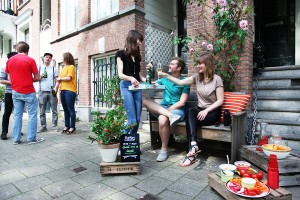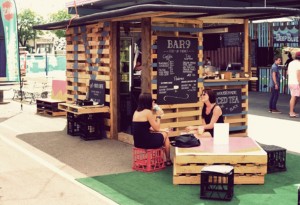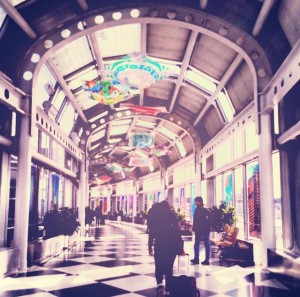I suppose when it feels like the end, you kind of want to go back to the beginning. I’ve been working since graduating this May for 20-35 hours a week, but now that that contract is over and I am only working part time, I feel the need to take a break and just focus on me. I have been go-go-go about realizing opportunities and moving onward and forward since graduation that I feel like I haven’t had time to breathe or be myself and focus on what is calling to me.
I feel the need to wipe the slate clean and move forward with renewed focus, a clear direction. And this requires some time truly away from my commitments to reset myself. So I’ve kind of outlined two goals:
1) Distance between undergraduate life and who I am now.
Most times, I still feel deeply connected to the UBC community although I have left. I am still taking an extracurricular course while juggling work, my work on UBC campus, and personal development goals. I feel too connected. For myself, I need time away to truly close that chapter of my life and embracing what is ahead.
Part of that is committing to it in writing.
I graduated in May, 2015. For the ceremony, I had the honour of being the graduating speaker. I spoke to what it means to be a part of the Land and Food Systems Faculty and what each and every student should take with them moving forward. I am truly thankful to have the LFS community be the community that I can always come back to. Even looking back on it now, I realize how often we forget how to stay motivated and the privileges we have. Posting it below is for me to remember that.
2) Embracing risk, letting creativity take over. Stop dreaming, start doing.
“There are two rules that I always adhere to. And that is to work hard and be brave.
And I think the essence of hard work is one that’s pretty straightforward. It’s that you’ll never be the best looking, you’ll never be the tallest, most talented, you’ll never have the most money. There will always be someone who’s better at whatever you’re doing than you are. But you’re can always be the hardest-working person in the room. And I think the hardest-working person will always win.
Life shrinks and expands in direct proportion to one’s willingness to take on risk. And I think when it comes to exploring, the act of exploration, is the act of assuming risk. the greater risk taker, the greater explorer.”
–Casey Neistat, 2014
Casey Neistat is a filmmaker. He posts daily vlogs and I truly enjoy watching. More often than not though, I stay because his perspective motivates me to take action. Do or do not, there is no try. Watching him inspires me to embrace the side of me that wants to learn, explore and create something. I should do whatever I need to do in order to do the things I love – even if what I love isn’t for money or won’t help me survive. Other things can give me money and other things will help me survive. What’s important is that you keep your soul and your spirit alive by never giving up what you love.
Work harder. Be braver. Do more.
Let’s go, Collyn.
—–
Friday, May 22nd, 2015 | 4:00pm Convocation | Faculty of Land and Food Systems
Chancellor Gordon, President Gupta, Dean Yada, faculty, staff, distinguished guests and fellow graduates. I am very honored and humbled to be speaking on behalf of our graduating class today.
I wrote this speech like I wrote all my assignments at UBC: by staying up all night and drinking too much coffee.
Being in LFS, of course, I didn’t always have to go through this alone. Let’s be real: group projects were the bane of our existence. Whether it was spending our four-hour classes together drinking buttermilk or four nights a week hoping Connect wouldn’t implode at 11:59–we sure have gone through a lot together.
Throughout our years, we’ve been called many things. We are the class of mostly-construction. The class that almost got the New SUB. The class that did watch a cow give birth at Kitzel Farm. And when other students said “cool!” and asked us which program we were in, our answers were followed by “Oh…I didn’t even know that was a faculty”.
Yes, parents, thousands of dollars and 4 or 5 or 6 years later–you’ve arrived only to find that there are students on this very campus who don’t even know we exist.
And that’s okay. Because while the rest of campus was looking to survive their next quiz or exam – we were already outside these walls learning, creating and changing our communities.
They tell us we are a generation that is too idealistic and narcissistic. That we are lazy and entitled. Let me tell you now that “they” don’t matter. Yes, our dreams are big. But our will to do something worthwhile in this world is even bigger.
I am so lucky to have gone through this journey with all of you. So lucky to have been challenged and inspired by some of the most innovative and enthusiastic minds, and supported from the most compassionate and open of hearts.
As I scoured the Internet, looking for quotes for this speech, I came across one that fits with our faculty.
Heavy,
so heavy, is the task of my generation.
Whether it is creating healthier bodies, cultivating more sustainable soils, or solving global issues such as climate change–students from This faculty Go Boldly
to tackle the great issues of today.
We,
are a community of doers.
“Bright enough to succeed in any job, but brave enough to do what we love.”
And I know that we all will,
because we have already started.
It is with this that I announce this year’s
Graduating Class Gifts to the University.
They are:
$5,000 to Land and Food Systems Undergraduate Society for Kitchen Equipment Upgrades
$5,000 to the Agora Café for Security and Equipment Upgrades
$8,000 to the SEEDS Sustainability Program for Community Development
$5,000 to the Geological Engineering Undergraduate Club
and
$6,175 to the AMS’s Aboriginal Student’s Commissioner for a Musqueam Woven Tapestry
Now, of course, we could not be who we are today without the support of our friends,
family
and teachers who have made Our journeys possible.
For this next part, I’d like to begin by reading to you an excerpt from my LFS250 literature review.
Yeah, you all know what I’m talking about:
[ahem]
“David Orr in “Place and Pedagogy” denotes that the “…knowledge of place – where you are
and where you come from
– is intertwined with knowledge of who you are”.
Extrapolated, this means that being in the right learning environment
is such a powerful experience
that it can change our behaviour and shape
who we become”
I’d like to take this time to thank our professors, teachers and mentors for placing this at the forefront of our education. So lucky are we to learn from faculty who demand that we Engage with our world
in order to enrich our understanding of it.
Through project after project and class after class, faculty that push us to excel and understand that success
is not defined only within the classroom.
A faculty that ensures that we are cognizant
of those who were not given the same opportunities
that we have.
That solving the issues we will face
is as much about understanding Where we are from
as it is about What we know is true.
Thank you for your guidance, your understanding and especially for extending deadlines and scaling our grades.
We wouldn’t be walking across this stage without you.
And to our families, thank you. Without your love and support, we would never have had the freedom
to be those bright-eyed children dreaming for a chance
to change the world.
You have taught us so much. We hope you can be proud of who we’ve become,
and continue to be proud of all that we will achieve.
Finally to my peers. Friends,
we’ve made it.
Whether you know exactly what you will be doing, or if you are taking the time to just figure it all out – revel in This moment.
Enjoy it.
UBC is not just the place we received our education,
but also the place where we grew up.
It is here that we learned that sleep, is our friend and procrastination, is not.
We learned that yes, construction can change every day, and no, it’s impossible to make it from Buchanan to Forestry in 10 minutes.
We learned that a singular failure does not define who we are, and that the greatest gift of all from UBC
is the community we have had the chance to call home.
Today we get to reminisce on our hard work,
and as we move forward,
to never forget the community we will always be a part of.
Congratulations! It has been such a privilege to call you my classmates. And now, without further ado, it is my honour to present to you the Land and Food Systems Class of 2015!





